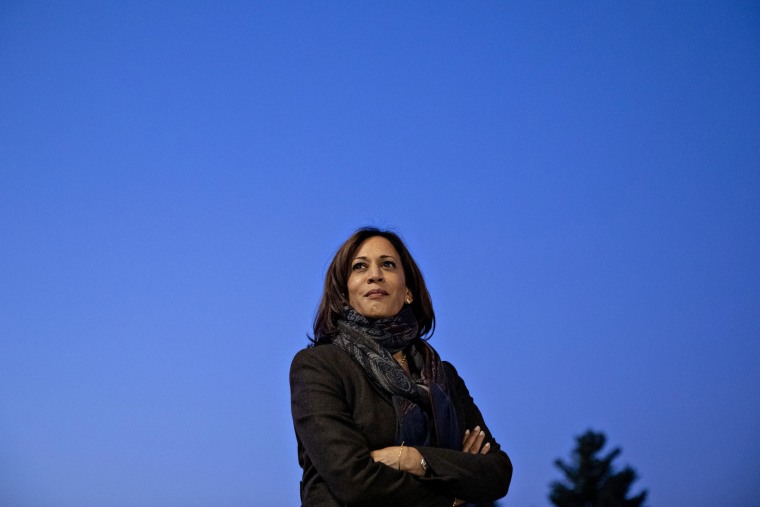On Tuesday, Democratic Sen. Kamala Harris informed her staff that she would be suspending her presidential campaign. Harris, whose large number of Democratic Party endorsements had been second only to former Vice President Joe Biden, announced via tweet that while her campaign has officially ended, she “will keep fighting every day for what this campaign has been about. Justice for the People. All the people.”
Harris’ exit from what was once a historically diverse pool of presidential hopefuls signals how truly difficult the fight for all people to be represented by their elected officials truly is.
But Harris’ exit from what was once a historically diverse pool of presidential hopefuls signals how truly difficult that fight — the fight for all people to be represented by their elected officials and to be heard by those in positions of power — truly is. Because when diverse candidates such as Harris or New York Sen. Kirsten Gillibrand drop out of a presidential race even as white male billionaires such as Michael Bloomberg and Tom Steyer enter it, something is broken.
When candidates like Julián Castro, who represents one of the largest ethnic voting blocs in the country, cannot make it to a debate stage, but affluent men flushed with enough cash to continuously fund what can only be described as vanity projects can buy their way to the podium again and again, our country’s political process is crippled.
And yet, this is exactly how the current presidential primary is set up to operate: empower the rich, deter the marginalized.
It has long required the support of the wealthy — and a certain level of personal wealth — to run for president of the United States. In 2016, billions of dollars were raised by Donald Trump's and Hillary Clinton’s presidential campaigns. But the rich control much of this cash flow. In 2014, according to the Center for Responsive Politics, the top .01 percent of all income earners in the United States accounted for 29 percent of all political committee fundraising.
There are many reasons why this is a dangerous thing. But a big one is accountability. Former New York City Mayor Michael Bloomberg, who has vowed to forgo personal donations to his campaign and will refuse a presidential salary if elected, claims his personal fortune makes him independent. This is potentially a good thing, especially where special interest and lobbying groups are concerned. But it also makes him beholden to no one. Whereas Sen. Bernie Sanders and Sen. Elizabeth Warren have worked hard to forge connections with grassroots donors. Bloomberg is saying he doesn't need to hear from Super PACs — or from individuals.
With Harris out of the picture, the candidates who have so far qualified for the December presidential debate are all white. The Democratic National Committee purposefully has made the bar higher and higher to get into the debates — this makes sense in theory, as a debate with 20 candidates is nearly useless. But the end result seems to be that rich, white men are succeeding while more politically qualified and certainly more diverse candidates such as Julian Castro or Sen. Cory Booker struggle.
The make-up of the debate may change as we get closer to the event (Bloomberg, too, has yet to qualify) but it’s a reminder of how the deck is already stacked against candidates of color (and to a lesser extent, women.) Harris is one of only two African American women elected to the U.S. Senate — ever.
It is also our lived experiences that are silenced when money is allowed a stranglehold over our political process. Gillibrand lead the discussion of systemic sexual violence against women, arguably to the detriment of her campaign, before she dropped out at the end of August. Unlike many within her own party, Gillibrand pushed to keep her colleagues accountable for sexual misconduct. Now that her voice is missing from the election, those of us who have survived sexual assault and abuse are left wondering who will champion the issue in her absence. She also made vital if unsexy issues like parental leave a central part of her platform.
From abortion rights and reproductive justice to trans rights, maternal mortality, affordable child care, paid family leave, public education reform and systemic racial injustice, the issues that impact Americans on a daily basis — and which billionaires simply have not experienced — naturally fall to the back of the line. It’s “how do we reach the moderates?” and not “how do we protect the marginalized?” that becomes the prevailing political question.
You don’t have to have supported Harris’ candidacy — or even liked her very much — to understand why her dropping out now is bad news for the Democratic Party. Our political system is massively imperfect; that’s a given. But current party leadership has designed the primary in such a way that the most diverse candidates don’t seem to have a fair fighting chance. This is bad for the party, and of course, it’s bad for voters. When it is money, and not experience, innovative thinking or eloquence that determines who gets to stay in the presidential race, our democracy suffers. And it’s suffering still.


